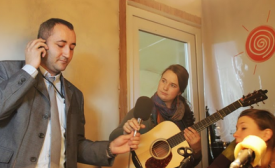music diplomacy
The first hotel specializing in the music of Cuba, the Blue Salsa Club, will open its doors in November with a new idea in cultural tourism in the resort community of Varadero, the most famous on the island, local media reported Sunday. The project hatched by Spain’s Blue Bay group and Cuba’s Paradiso cultural tourism agency will promote musical genres like salsa, guaracha, bolero and the Caribbean island’s traditional dances.
Cuban-born trumpeter Arturo Sandoval is set to receive the Presidential Medal of Freedom later this year for his contributions to the world of music. He's won nine Grammy awards and an Emmy. He's also collaborated with legends like Frank Sinatra and Johnny Mathis, and contemporary stars such as Justin Timberlake and Alicia Keys.
Planting K-Pop on US soil, SM Entertainment announced its plans to create the SMTOWN Museum in Los Angeles. On August 7, SM Entertainment revealed that it will be building a place for US residents to experience hallyu in Los Angeles. The new SMTOWN Museum (tentative name) will be located at 6th and Oxford in Koreatown. “We’ve been planning for a long time to create a place where residents in Hollywood could experience hallyu, but we decided that it was more meaningful to bring US residents and tourists who were interested in hallyu to LA’s Koreatown,” said the agency.
It was only a matter of time. In the span of a decade, Korean pop music has gone from relative obscurity to sweep the entire Asian continent. Now, with a little help from Psy, K-pop has cast its eye on the potentially lucrative markets in the Americas and Europe. First came the United States, then Mexico. MBLAQ, a popular Korean boy band, arrived in Mexico this week for their first concert in Central and South America.
I got into the public diplomacy game as a local hire as a Foreign Service National (FSN) working for the Israeli Foreign Ministry as a Press Officer for the Consulate General of Israel to the Southwest. As such, I have a deep appreciation for others who work as FSN for various foreign ministries and the U.S. Department of State.

I got into the public diplomacy game as a local hire as a Foreign Service National (FSN) working for the Israeli Foreign Ministry as a Press Officer for the Consulate General of Israel to the Southwest. As such, I have a deep appreciation for others who work as FSN for various foreign ministries and the U.S. Department of State.
What’s the greatest reward for being a cultural ambassador? According to Keola Beamer, master of the Hawaiian slack key guitar, it’s that moment when you see that you’ve truly touched someone and “you see this beautiful light in them. That’s what we do it for.” Beamer, his wife, dancer and hula master Moanalani Beamer, and fellow guitarist Jeff Peterson traveled through Brazil with the American Music Abroad (AMA) program earlier this year to share the “philosophy of Aloha, a warm philosophy of embracing other people and cultures” in the world.
It’s a long way from Timbuktu to Lincoln Center, and not just geographically. For the musicians performing on Wednesday in the Festival au Désert as part of the Lincoln Center Out of Doors series at the Damrosch Park Bandshell, the path from there to here has included an Islamist takeover of their Saharan homeland, followed by a religious war on music and then a French-led military intervention.







